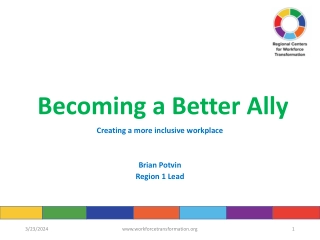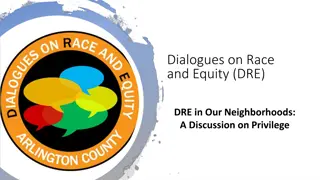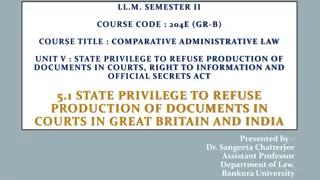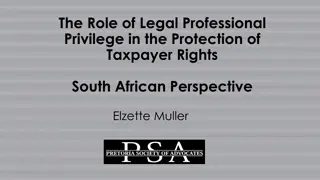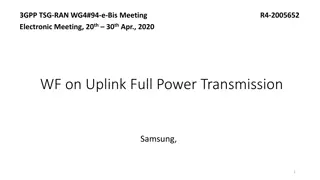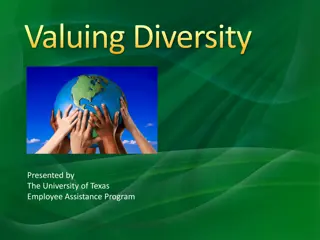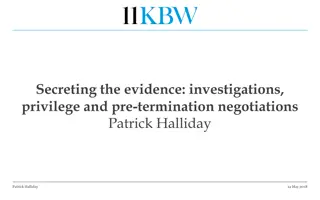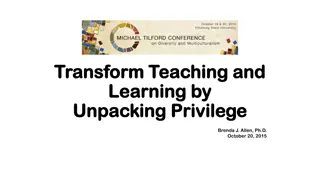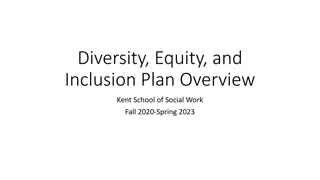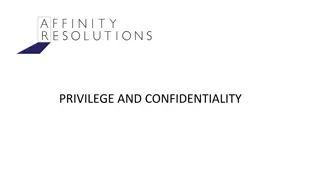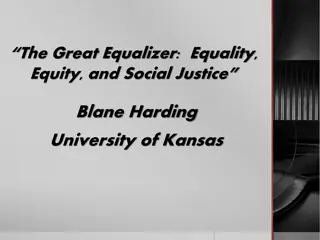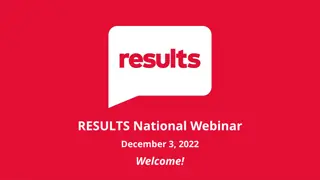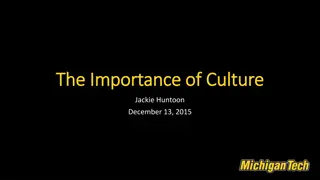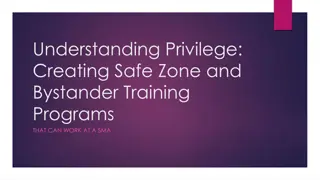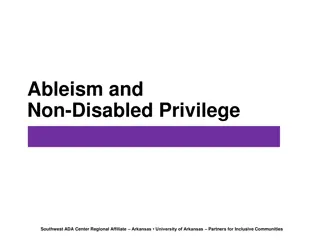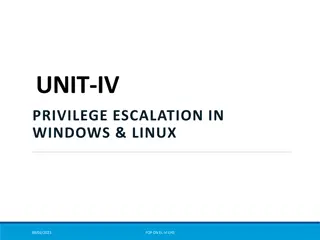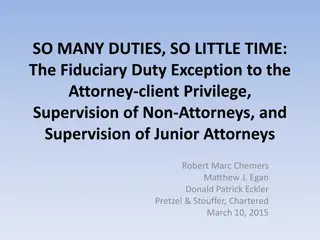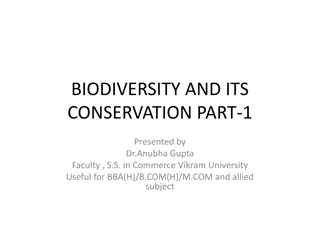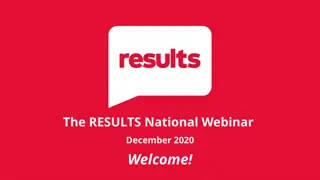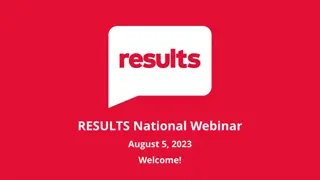Understanding Privilege and Oppression in Diversity Training Session
Explore privilege, intersectionality, and structural inequity in a training session led by Jo Yuen. Participants will learn key terms, allyship strategies, and engage in discussions to foster a safe and open environment. The session includes a working agreement, introductions, breakout discussions, and insights on privilege as a system of advantage. Terminology is provided to deepen understanding of societal inequalities.
Download Presentation

Please find below an Image/Link to download the presentation.
The content on the website is provided AS IS for your information and personal use only. It may not be sold, licensed, or shared on other websites without obtaining consent from the author. Download presentation by click this link. If you encounter any issues during the download, it is possible that the publisher has removed the file from their server.
E N D
Presentation Transcript
Beyond Diversity Jo Yuen (they/them) Founder, Anti-Oppression Trainer, JYP Consultancy
Todays session Today s session Increase understanding of privilege, intersectionality and structural inequity. Overview of key terms and definitions. Learn key ways to use privilege and be an active ally. Create a safe space and foster an environment that encourages people to openly discuss these topics.
Working Agreement Working Agreement Listen to each other with respect. Listen to understand others. Commit to learning, not debating. Be mindful of power dynamics. Respect confidentiality. Speak from your experiences; speak from I . No expectation to share your experiences. Taking risks participating, making mistakes is part of learning. Supportive and challenging. Free to leave/return without explanation.
Introductions Introductions Name Pronouns (optional) 1 word to describe how you are feeling
Discussion in breakout rooms Discussion in breakout rooms What feelings came up for you during the exercise? What might it feel like to move through life as someone who raised their hand a lot? What might it feel like to move through life as someone who did not raise their hand a lot? Any other comments.
Privilege: a system of advantage Privilege: a system of advantage Seeing people who look like you well represented in positions of power. Being assured that your entire neighbourhood is accessible to you. Possibility Dignity Authenticity Never having to hide or lie about your sexuality. The ability to walk into a shop and have the owner assume you are there to buy things and not steal them. Using public toilets without fear of verbal abuse, physical intimidation or arrest. Legitimacy Safety
Terminology Terminology Privilege: an unearned advantage given by society to some people but not all. It s often invisible to the person who has it. Oppression: systemic, pervasive inequality that is present throughout society, that benefits people with more privilege and harms those with fewer privileges. Intersectionality: the concept that people can be subject to multiple systems of oppression that intersect and interact with each other. Power: The ability to control circumstances or access to resources and/or privileges. Adapted from https://frameshiftconsulting.com/
Example Example Privilege: The ability to walk into a shop and have the owner assume you are there to buy things and not steal them. Oppression: The self-reinforcing system of stories, TV, news coverage, police, and legal system stereotyping Black people as criminals, that benefits non-Black people and harms Black people. Adapted from https://frameshiftconsulting.com/
Terminology Terminology Marginalised person: a member of a group that is the primary target of a system of oppression. Ally: a member of a social group that enjoys some privilege that is working to end oppression and understand their own privilege. Note: Being an ally is about action - it is not an identity in itself. Adapted from https://frameshiftconsulting.com/
Example Example Marginalised person: Any Black person who wants to enter a shop. Ally: A non-Black person who donates to legal system reform organisations, actively objects to racist stories, calls on their MPs to support police reform, and reads news articles about this privilege. Adapted from https://frameshiftconsulting.com/
The Cycle of Oppression The Cycle of Oppression Negative ideas/stereotypes (of a marginalised group) Negative outcomes inequity (for a marginalised group) Structure laws/ policies/ institutions Infographic based on resource from www.fearlessfutures.org
Power Power Power: The ability to control circumstances or access to resources and/or privileges. Privilege grants you power of legitimacy, possibility, authenticity, dignity and safety. Allies use their privilege to give marginalised people legitimacy, possibility, authenticity, dignity, and safety. The more privilege and power an ally has, the less risk they have to bear.
Which identities hold the most social power? Intersectionality: people can be subject to multiple systems of oppression that intersect and interact with each other.
Inclusion and Equity is Inclusion and Equity is Disrupting the cycle of oppression by giving marginalised people these things: Possibility Dignity Authenticity Educating yourself about your own privilege, so you will know when you can use your power. Safety Legitimacy
Ally skills Ally skills Talk about it Diversify your feed Learning mindset Educate yourself Listen Don t outsource critical thinking Change policy Amplify marginalised voices Follow your discomfort
Activity: Good Allyship Consultancy Activity: Good Allyship Consultancy Groups of 3-4. 15 minutes. Read case study: John (on slides 2-3) In breakout rooms 1 person share screen (PowerPoint file) and be the nominated writer/typist. You have 10 minutes to discuss and type up allyship advice (on slides 4-6). Return to the main room.
Activity: Good Allyship Consultancy Activity: Good Allyship Consultancy John is a 34-year-old, white, cisgender, heterosexual, non-disabled man. He s married with two young children. John has a managerial position at work and has a good relationship with the senior leadership team. Outside of work, John likes to spend as much time as possible with his family. If he has alone time he likes to catch up on the news, read a book or binge-watch a few episodes of something. While he doesn t post much, he spends about an hour a day reading and scrolling through social media (Facebook, X fka Twitter and Instagram mainly). John is starting to understand the concept of privilege but feels uncomfortable thinking about it. He feels guilty for the privilege he has and feels powerless to do anything about it. He often thinks, is it my place to do something? and also worries that he ll end up mansplaining or saying something wrong.
Activity: Good Allyship Consultancy Activity: Good Allyship Consultancy As a Good Allyship Consultant, what would you advise John that he could do? Think about: How can John understand his privileges better and get more comfortable in these conversations? What sources of power does John have? What can John do to educate himself and develop his worldview to be more inclusive? Do you have specific recommendations? (e.g. TV programmes, books, websites etc.) What conversations can John start, and with who? What happens if he makes a mistake/says something wrong?
Action planning Action planning Think about different areas of your life e.g. work, family, friends etc. Where do you have power/safety? Who can you have conversations with? Which areas are you uncomfortable talking about? How can you make it easier to integrate your learning into your everyday life? (Hobbies, books, films, social media etc.)
Links Links Allyship resources: https://padlet.com/info8899/qkqahp0eyf4wvujw Feedback form: https://forms.gle/7Zanqq4CZRfiKdyC9
Questions? Contact us at info@jypconsultancy.co.uk


